
Iceberg by David Banks.
In Brief: The futuristic year of 2006 is home to an Antarctic research-base trying to stop the Earth's magnetic poles from reversing. The Doctor, travelling solo, arrives on a nearby cruise-ship and discovers a plot by the Cybermen to take over the planet.
Again.
Iceberg really shouldn't work. Any of its ingredients taken on their own (The Doctor alone, the "near"-future, links to multiple past stories, the Cybermen, etc.) would normally be an exercise in tedium. However somehow David Banks has managed to put all of the parts together in such a way that, while not great literature, is very enjoyable. I think what makes the book work is that (unlike most of their television stories) Banks doesn't see the Cybermen just as a droning replacement for the Daleks or other monsters but instead remembers their original intent as a sort of proto-Borg 60s "fear of organ replacement" creation. It must have helped that he'd earlier written a book linking together all of "Cyber-History" (there's an entire sub-genre of Who-books based around trying to figure out its continuity) as well as his playing the Cyberleader in every 1980s Cyberman story (yes, really).
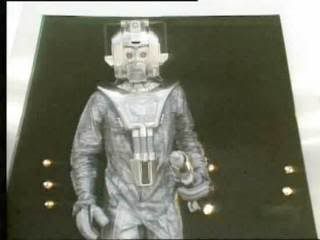
The book's author.
Oh, and he also played The Doctor briefly. If you know the context you win a cookie.
It's interesting that despite being the centre of the Metal Meanies from Mondas' revival in the 1980s Banks seems to have much more affection for the 60s more "robotic" version. This is obvious since Iceberg almost plays as a sequel to the Cybermen's attempted invasions in stories from that era.
It is best never to discuss their only 1970s appearance ("Revenge of the Cybermen"). Or worse to actually watch their only 1970s appearance ("Revenge of the Cybermen").
While it also may seem odd to have a book written in the early-90s based around stories made 25 years earlier a few things from that time are important. First, in 1993 Whodom was still in the thrall of the surprise rediscovery of 1967's "The Tomb of the Cybermen" in a vault in Hong Kong. For the TV-show starved masses it was like getting a whole new adventure. Also a hoax around the same time (which actually made it into Doctor Who Magazine) that the final (missing) episode of the Cybermen's debut in "The Tenth Planet" had been returned was making the rounds which made that story of great interest. Lastly the remaining episodes of 1960s stories "The Moonbase","The Wheel in Space" and "The Invasion" were released on VHS around the same period.
So 1993 was really the year of the Cybermen for Doctor Who fans. Many were getting to see the earlier stories for the first time and finding these Cybermen to be an interesting contrast to their more recent appearances. I don't think it's that the 80s Cybermen were rubbish (well except for maybe in 1985's "Attack of the Cybermen"), it's just that for the most part they were Generic Monster #2 who would show up every so often to try to take over a planet while waxing lyrical on the benefits of not having emotions. They were sort of like an army of tin-foil clad Mr.Spocks.
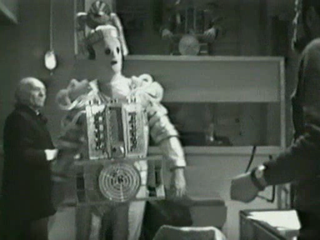
The Cybermen as they were in 1966.
Also in the 80s for the most part the writers had forgotten what made the Cybermen scary back in the day, that they weren't out to conquer but instead to turn everyone into them.
So cosmic Communists to the Daleks' fascism?
So with this aspect of body-horror and loss of personality being brought to the Cybermen works well. Also the book is really more of an extrapolation of the earlier stories rather than a sequel. While seeing those shows is good you still can understand what's going on without in depth detail (so in very "new series" in that respect).
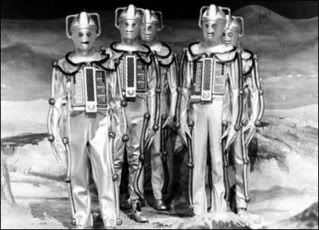
The Cybermen show off their 1967 duds.
But as for the non-Cybermen related parts of the book, unfortunately Banks doesn't do so well. While it's not terrible unfortunately most of his characterisation never rises above caricature (The hard-nosed general! The Camp Actor! The Cynical Artist! The Plucky Reporter!) even for temporary companion Ruby Duvall. The first half or so of the book does drag a bit as we wait what feels like forever for the Doctor to show up in his Tardis-shuttlecraft (aka The Jade Pagoda). Although perhaps this build-up is intentional since another aspect of the 1960s Cybermen stories is how for the most part they're barely in them, rather than lurk in the background for the first half of the story until their big reveal half-way through.
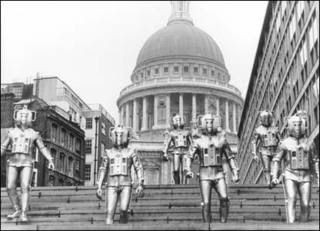
1968. Another year another outfit.
But despite this shortcoming I still enjoyed Iceberg. I think this is probably about as good as a book about the Cybermen can be since there is the problem that perfectly logical robotic beings aren't great conversationalists and therefore are limited from having the requisite gab-fests with the Doctor (The Daleks had the same problem until Davros turned up). And while setting the book in 2006 (remembering it was written in 1993) is a bit silly it doesn't create too many problems. We're missing the Internet, mp3-players, lap-tops and cell phones but there *are* overdone pat-downs for International travel.
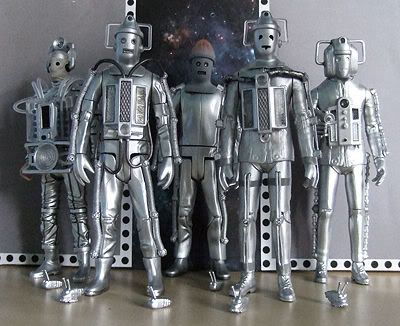
Cyberwant!
So overall a good read. It's starting to feel like the range is getting its groove back.
Oh, and for the record the things that *call* themselves Cybermen in the post-2005 show totally aren't. So there.
No comments:
Post a Comment